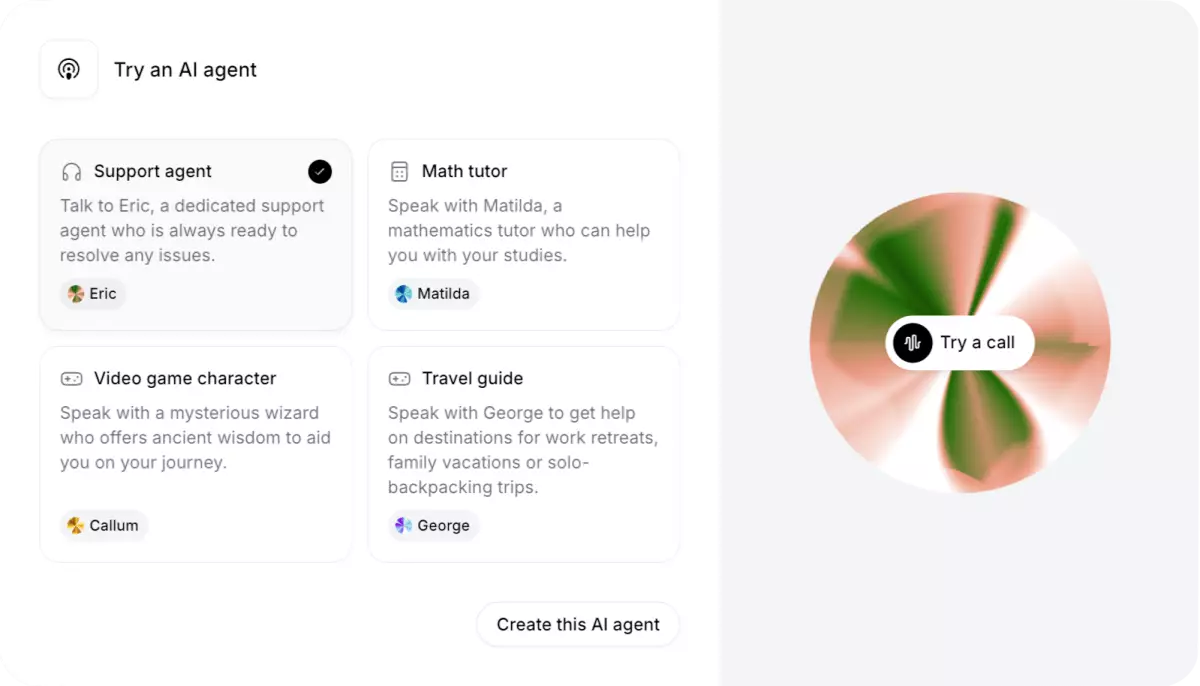ElevenLabs, an emerging player in the world of artificial intelligence, has recently expanded its suite of offerings by launching features aimed at building conversational AI agents. Renowned primarily for its high-quality AI voice cloning and text-to-speech API, the company is now enabling developers to create multifaceted conversational agents on its platform. This development follows a trend in the tech industry where companies seek to enhance customer engagement through advanced communication tools. With these new capabilities, ElevenLabs is positioning itself as a formidable competitor in the conversational AI landscape.
On their developer platform, users now have the ability to construct fully-fledged conversational agents. This includes an array of customizable variables, such as the tone of voice and the length of responses—elements that play a significant role in user experience. According to Sam Sklar, ElevenLabs’ head of growth, many clients were already leveraging their existing capabilities to craft conversational agents, although challenges remained in integrating knowledge bases and managing customer interruptions. This feedback prompted ElevenLabs to streamline the process by offering a complete pipeline for developing conversational bots.
Users can create an agent by either selecting from predefined templates or starting from scratch. The customization options are extensive; they can determine the primary language, initial messaging, and system prompts that establish the agent’s persona. Moreover, developers must choose a robust language model—options include Gemini, GPT, or Claude—totaling various response styles and creativity levels. Such specificity ensures that each interaction can be tailored to different user needs.
Enhancing Functionality with Integrations
The platform allows for the addition of user-generated knowledge bases, which can include documents, URLs, and text blocks. This feature is particularly important as it enables organizations to embed their proprietary knowledge into the conversation flow, effectively allowing customers to receive personalized responses. There’s also the option for developers to integrate their custom Large Language Models (LLM), providing further flexibility in how the agent operates.
Additionally, ElevenLabs has designed its SDK to be compatible with popular programming languages, namely Python, JavaScript, React, and Swift. This broad compatibility facilitates easier integration into existing systems and workflows, which is often a challenge for companies looking to incorporate new technologies. Furthermore, once implemented, businesses can utilize WebSocket API for deeper customization options, resulting in more seamless user interactions.
A critical component of utilizing conversational AI effectively lies in the data collection feature that allows agents to gather essential information, such as customer names and email addresses, during interactions. This capability not only enhances the personalization of conversations but also assists businesses in understanding customer behavior and preferences. Evaluation criteria in natural language can also be defined to measure the success of each interaction, which is instrumental for continuous improvement in service delivery.
While ElevenLabs capitalizes on its text-to-speech technology, it acknowledges the necessity of developing speech-to-text capabilities to round out its conversational AI offerings. Currently, the company has refrained from marketing a standalone speech-to-text API; however, there are potential future plans to introduce this feature, aligning it with existing competitors like Google, Microsoft, and Amazon. This strategic decision indicates an understanding of the competitive landscape as the technology community emphasizes integrated solutions.
As ElevenLabs pursues new funding with aspirations of exceeding a valuation of $3 billion, it finds itself in a competitive environment alongside various voice AI startups, including Vapi and Retell. OpenAI’s real-time conversational API also presents a significant challenge in the market. Nevertheless, ElevenLabs remains confident that its comprehensive customization options and model-switching capabilities will give it a unique edge over such formidable competitors. By closely analyzing client needs and industry trends, the company is well-positioned to carve out a niche in the rapidly growing field of conversational AI.
The introduction of ElevenLabs’ new conversational AI features marks a promising advancement in the realm of artificial intelligence, particularly for businesses looking to enhance customer interactions. As the startup continues to innovate, the intersection of voice cloning and conversational agents could alter the way companies engage with their clients. By focusing on user experience, customization, and integration, ElevenLabs is setting its sights on becoming a leader in this transformative space. The evolution of conversational AI holds great potential, and with companies like ElevenLabs at the forefront, the possibilities are limitless.

